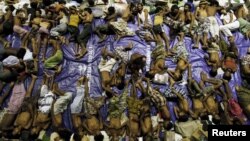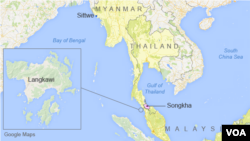Since Sunday more than 2,000 migrants have come ashore by boats or have been rescued off the coasts of Indonesia and Malaysia.
Officials said more than 1,400 Rohingya migrants were rescued Monday from four boats off the two countries' coasts. On Sunday, about 600 people aboard at least two overcrowded ships were rescued along the coast of Indonesia’s Aceh province.
An Indonesian official said those migrants, which included women and children, were tricked and told they were off the coast of Malaysia and were then told to swim ashore.
Some of the survivors were ill and weak with hunger and have been taken to Indonesian clinics for treatment.
At a mosque in northern Aceh, migrant Muhammad Juned explained to reporters his group had been at sea for two months.
Juned said there were more than 500 people on three boats. Asked where they were headed and why, he replied, “We wanted to enter Malaysia to earn money.”
Malaysian police said they are processing more than 1,000 migrants on the resort island of Langkawi.
International migration group
Spokesman Joe Lowry of the International Organization for Migration's regional office in Bangkok told VOA that IOM staff members were arriving Monday in Indonesia to assist the migrants.
“People are brought in, registered, given accommodation, food, water, medical attention if they need it by a combination of IOM teams and the authorities, depending on what the authorities need and what they want us to supply," Lowry said.
Thailand, which is under military control, this month launched a crackdown on the trafficking of Rohingya Muslims to neighboring countries following the discovery of dozens of human remains in mass graves at so-called "slave camps" in the southern part of the kingdom.
That crackdown has, at least temporarily, deterred traffickers from bringing Rohingya ashore in Thailand, Lowry said.
“With all the attention on the camps situation in Thailand at the last couple of days and weeks it seems that Thailand is closed off for smugglers at the moment," he said.
Thailand’s army chief on Monday told reporters that a search continues in rough terrain for more camps where illegal migrants were detained.
The trafficking of Rohingya through Thailand is believed to go back until at least 1998, according to the governor of one Thai province.
Trafficking allegations
Some rights groups allege it has involved collusion between traffickers and Thai politicians and other authorities, including members of the army and navy.
Thai army chief General Udomdej Sitabutra denied any Army officers have been involved with trafficking Rohingya.
Thailand has arrested several politicians in recent days, accused of involvement in human trafficking.
More graves believed to contain bodies of Rohingya who were killed or died due to mistreatment in captivity continue to be found in abandoned jungle camps.
The ethnic Rohingya, considered by the United Nations to be one of the world’s most persecuted minorities, are from Bangladesh and Myanmar.
Myanmar, also known as Burma, is a primarily Buddhist country and considers the Muslim Rohingya illegal migrants from Bangladesh, although many Rohingya have lived in northern Myanmar for generations. They have faced sectarian violence in recent years, prompting a perilous mass exodus by sea.
Thailand has been a way station for those primarily fleeing Sittwe province in Myanmar and hoping to reach Indonesia or Malaysia, both majority Muslim countries.
Traffickers
But traffickers in Thailand have preyed on the Rohingya, demanding additional money for their freedom and selling many into debt bondage in Malaysia.
As a result of Thailand’s crackdown, thousands more Rohingya are certainly still at sea on rickety boats, said Chris Lewa, who runs the Rohingya rights group, The Arakan Project.
“I'm interested to see how many will start landing. I think there should be, at least, 7,000 in my opinion. But maybe not all landing – maybe some will return (to Myanmar or Bangladesh), who knows. But I'm just trying to monitor that," Lewa said.
The U.N. refugee agency (UNHCR) estimates 25,000 Rohingya and Bangladeshis boarded people-smugglers' boats in the first quarter of this year – twice as many as in the same period of 2014.






